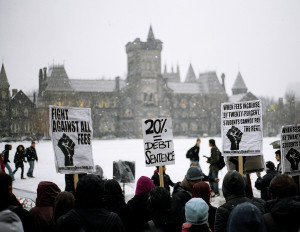
At the end of October, President Obama unveiled a series of executive orders calculated to address the country’s spiraling student debt crisis. The “Pay as You Earn” option would lower minimum loan payments for some students graduating in 2012, in an effort to ease what Melody Barnes, the director of the Domestic Policy Council, called “crushing loan burdens.”
The average debt burden of a student graduating in 2010 was 5 percent more than the previous year, a difficult challenge as graduates moved into an unfriendly job market. These graduates owed an average of $25,250, the highest student debt rate ever. The increasing amount of student debt has been sparking fears that student loans will be the next credit bubble – and the credit risk falls on Millennials.
There has been remarkably little public opinion research about what Americans think should be done to quell this burgeoning crisis – or if anything should be done at all. In our November PRRI/RNS Religion News Survey, we found that nearly two-thirds of Americans (66%) believe that the government should do more to help students pay for college and pay off student debt. While majorities of most demographic groups agreed, the differences according to race, age, religion, party affiliation and education level were quite fascinating:
- Nearly 8-in-10 (79%) Millennials (age 18-29) said that the government should do more to help students pay for college, compared to only 54% of seniors (age 65 and up).
- Almost 9-in-10 (88%) black Americans and over 8-in-10 (84%) Hispanic Americans said that the government should do more, compared to a much slimmer majority of white Americans (58%).
- Slightly less than half of white evangelical Protestants (49%) believe that the government should help students pay for college, compared to 89% of minority Christians, 74% of religiously unaffiliated Americans, and 73% of Catholics.
- Only 4-in-10 (43%) Republicans said that the government should do more to help students pay for college, compared to 82% of Democrats and two-thirds (66%) of Independents.
- Interestingly, college graduates were less likely than Americans who had a high school education or less to believe that the government should do more to help students pay off debt (58% vs. 73%).
These breakdowns show that while Americans, overall, believe that the government should do more to help students pay for college and pay off student debt, President Obama’s attempts to do so may not be popular among certain demographics, regardless of whether they are successful. Looking toward the 2012 election, however, Obama’s efforts to help students pay for higher education could make the difference for Millennials who are on the fence about working for his campaign.




